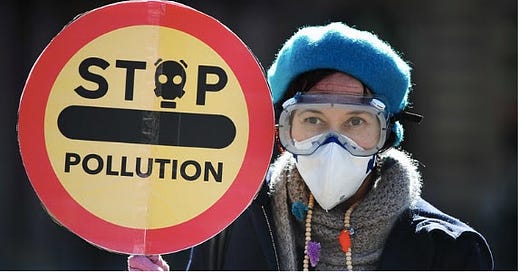Protecting Our Lungs

Hi, everyone. It’s been a while because I got busy with some projects, but I’m back. Perhaps this newsletter can provide you with a break from stocking up on toilet paper?
I want to tackle a topic that a lot of people are thinking about right now because of the coronavirus — the health of our lungs. As we face this crazy, scary moment, I keep thinking about how well my family’s lungs will fight off the infection if we get it. One big reason I prioritize the lungs is that my three-year-old son has asthma. In caring for him, I’ve gained a new appreciation for just how fragile (and important!) those lungs are.
So today I want to talk about air pollution, and how we can’t take it for granted that the air we breathe is clean and not harmful to our health. You might be asking, what does air pollution have to do with our climate crisis? The two are closely linked. If we improve the former, we help the latter.
Some background on the problem, sourced from a super-informative graphic in The New York Times:
What exactly is air pollution? It’s caused by particulates and gases released into the air. One important particulate is PM2.5. It’s called that because the particles are less than 2.5 micrometers in diameter, or one-thirtieth the size of a human hair. PM2.5 is released into the air when we burn things, such as coal, gasoline, chemicals or woody material (especially during wildfires).
The damage caused by PM2.5 is serious. The particles penetrate the lungs, and sometimes the bloodstream, causing or increasing the chances of asthma, cancer, heart disease, stroke, developmental problems in children, premature labor and miscarriage. In 2015, PM2.5 caused 4.2 million deaths worldwide and 81,000 in the US.
In wealthy countries, it’s easy to take for granted that the air we breathe is clean. Poor people and people of color around the world bear the brunt of air pollution, and the air in the US is certainly much cleaner and less harmful than it is in many countries.
But the trajectory in the US is heading in the wrong direction. Air pollution has increased since 2016, reversing years of decline. The main sources of the increase appear to be more people driving, the burning of natural gas and, in some areas, the prevalence of wildfires.
How can large-scale improvements happen?
Public policy is critical. The Clean Air Act of 1970, for example, is estimated to have saved 184,000 lives each each year from 1970 to 1990, and $22.2 trillion in health care costs. After major smog problems in the 1960s and ’70s, California became a clear leader in enacting legislation to limit air pollution. Lives were saved. If the Trump administration is successful at rolling back environmental protections and keeping California from passing stringent emission standards, then lives will be lost. It’s that simple.
Congestion pricing in London, Stockholm and Singapore has had a measurable impact on reducing air pollution. London has seen a 12% reduction in emissions and New York is set to be the first US city to roll out congestion pricing next year.
I recently learned about a great public awareness campaign called “Help Delhi Breathe” in one of the most polluted cities on the planet. The campaign by the team at Purpose Climate Lab took on the challenge of harnessing residents’ raw energy to provoke action by the Indian government. People were angry about the health problems caused by pollution but they didn’t connect them with policy solutions that would address the root cause. The campaign helped connect the basic right to breathe with the need for governmental action.
What can you do to have an impact?
We’re facing a climate crisis because, as a society, we have not considered the cost of releasing greenhouse gases into the air. The same is true for polluting our air. The biggest way to change that is through legislation, so you should support any bills that promote clean air, and hold elected officials accountable. Don’t be silent.
On a day-to-day basis, one easy thing to be aware of is idling cars and trucks. The pulmonologist of a friend’s child who suffers from extreme asthma said that the location of their apartment near an expressway and a street with lots of idling trucks undoubtedly makes it harder for him to breathe. So this isn’t a theoretical problem.
New York City just launched a great campaign with Billy Idol called #BillyNeverIdles. The campaign aims to raise awareness about pollution from idling cars and trucks. It also encourages citizens to report idling commercial vehicles. Much to the chagrin of my 7-year-old, I’ve become a citizen policewoman, asking drivers to stop idling and taking a video of them if they idle for more than 3 minutes (1 minute near a school), so I can report them.
Another potentially more difficult lifestyle switch is to consider ordering fewer things online. In New York City, 1.5 million packages are delivered daily, which causes pollution and gridlock, and fuels a pedestrian safety crisis. The demand for same-day delivery, especially for perishable goods, has played a big role in increasing the number of trucks on the road. So, once this pandemic has passed, one thing you can do is to reconsider whether you really need to order your groceries online.
Other interesting things I’ve read recently:
Mandatory composting could happen in New York. Food absolutely shouldn’t be thrown in a landfill. It doesn’t compost there. Instead it emits methane, which is bad. (NYT)
A study found that tropical forests are losing their ability to absorb carbon. (Guardian)
How Big Oil and Big Soda teamed up to give us unrecyclable plastic, an environmental disaster. (Rolling Stone)
Thanks for reading, and please share your feedback. Also ask your friends to sign up.
Fiona
(Image credit: Ian MacNicol / Friends of the Earth Scotland)

